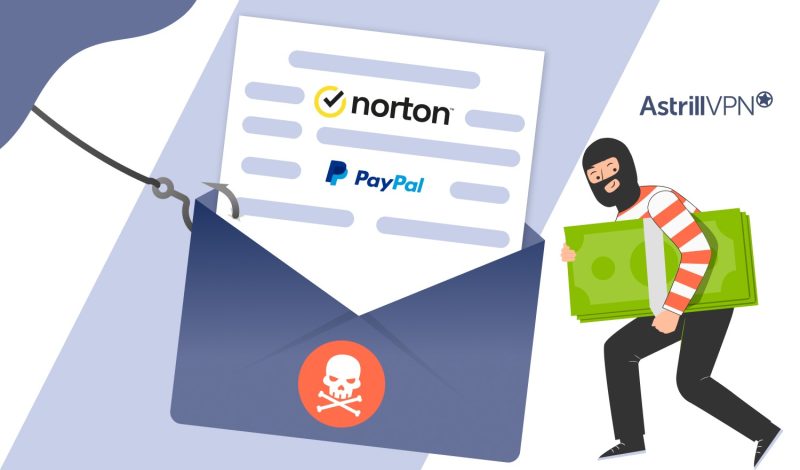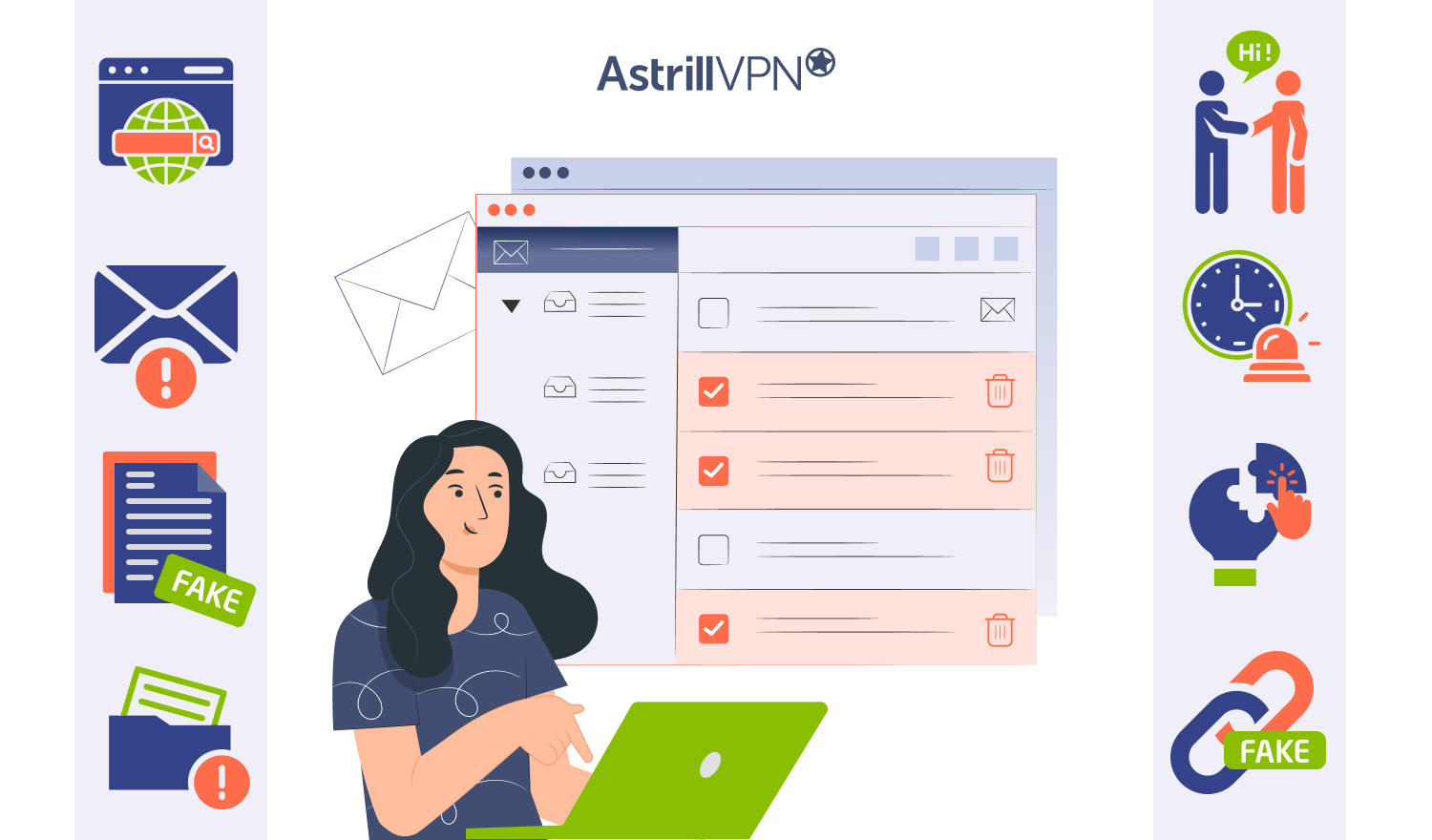The Norton PayPal Scam – What Is It & How To Avoid Falling Victim To It

Urfa Sarmad

The Norton PayPal email scam is a fraudulent email scam falsely claiming that you’ve renewed your Norton subscription. The scammers send these emails intending to steal your account and trick users into divulging sensitive data, such as their financial details. There are various effective ways to protect yourself from these online scams, including investing in reliable anti-virus software. As we explore this guide in detail, we will discuss the Norton PayPal scam, what you should do if you fall victim to it, and what steps you can take to reduce the chances and protect yourself from all of these scams. So, to uncover more details about the PayPal Norton Scam, just keep reading.
Table of Contents
What Is The Norton PayPal Scam?
The Norton PayPal scam occurs when you get an email that you’ve made a payment to Norton through PayPal, and you’re instructed to contact customer support. However, this email is not sent from Norton, and the customer support number is the number of scammers who will try to steal your sensitive and confidential data. These emails usually include a fake PayPal customer support number, suspicious links, and other malicious attachments. The purpose of these bogus emails is to extort sensitive data out of you and even convince you to give up your money.
You must remain cautious when receiving emails that claim to be from a renowned company, especially if they’re asking for confidential information or money. Always be sure to check the sender’s email address and all the links and phone numbers before responding to the email. There is a list of legitimate Norton domains that you can check before you decide to respond to the email. Remember that the Norton team would only contact you if your subscription plan weren’t renewed, your account wasn’t active, or there were any billing failures.
What Should You Do If You Receive The Norton PayPal Scam?
If you receive the Norton PayPal scam email, do not call the customer support number or respond to the email at all. Report this scam to the relevant authority and delete this email from your inbox. If you think your sensitive information or payment details are compromised, you need to contact your bank or credit card provider as soon as possible. If you’ve received the Norton Paypal scam email, then you need to take a couple of necessary steps:
- Don’t open any links or attachments found in the email. The attachment or link can also potentially contain Malware, so be cautious.
- Don’t provide any of your sensitive or confidential information. Scammers will ask for your personal information, like your address or credit card information, to steal and use your identity for fraud.
- It would help if you also verified the email’s and the sender’s authenticity.
- Ensure that you report the email as spam. This ensures that other people will not fall victim to this scam.
- If you’ve opened the attachment, then make sure to run it through reliable anti-virus software to protect your device from a Malware attack.
- If you’ve already provided confidential and sensitive information, you must contact your bank and credit card companies and monitor your PayPal account for suspicious activities.
- It would help to remain cautious when receiving emails from unknown and suspicious sources. It would help if you took the necessary steps to protect yourself from these scams.
How Can You Detect The Norton Email Scam?
Various ways will allow you to identify whether the email you’ve received from Norton is fake. Even if the email appears legitimate, some telltale signs will easily allow you to pinpoint these Norton scams in next to no time. Here are some things you need to be looking out for:

- A generic greeting is used as opposed to your actual name (e.g., “customer” or “dear.”)
- The sender’s email address isn’t associated with a legitimate domain name.
- If you’re on Gmail, and you’ve received the email on Gmail, then you may receive a warning message if the email is dangerous. However, this isn’t always the case, so you must be careful, even without warning signs.
- If the email says that you’ve already paid for a Norton subscription, even though you haven’t, it’s a fake invoice. The scammers want you to contact the fake customer support number they’ve provided and will try to steal your money if you call them.
- If the email creates a sense of urgency, that’s a big sign that it’s a scam.
- The email asks you to click on a link to resolve the issue. Most reliable and reputable companies will never ask you to disclose or divulge sensitive information, such as credit card numbers, by clicking on a link via email.
- The email has poor spelling, grammar, and sentence structure, which is a telltale sign that the email is not from a reputable source.
- If the email includes links to fake URLs, it’s most definitely a scam. Don’t share any of your personal or confidential information on these websites.
- Although legitimate companies will communicate with you through email, they will never email you a link to log in or update your account. Phishing emails can have severe consequences for people who fall victim to the scammer’s tactics and accidentally divulge their sensitive information to scammers, who then use it for identity theft.
How Can I Protect Myself From Scams Like These?
Now that you’re aware of these Norton scams and the damage they cause, as well as how to identify them, it’s time to look into the most effective ways to ensure that you’re protected from these scams in the future. So if you’re ready to discover how to avoid Paypal Norton scam, let’s start immediately.
1) Use Reliable Antivirus Software
One of the most effective ways to protect your devices and sensitive information from these scams is to invest in reliable antivirus software to protect you against cyber threats. A reliable antivirus scans for all online threats in real time and immediately removes them from your device. If you’re looking to invest in an antivirus, having many other valuable security features like firewall protection, email scanning, and ransomware protection would be best. It should also have regular updates to stay ahead of all the emerging threats.
2) Updating Your Operating System
You must keep your operating systems up to date, so as soon as an update is released for your device, you should download and install it immediately. These essential updates can include anything from security updates, security fixes, vulnerability patches, and other essential maintenance.
3) Avoiding Public Networks
Be extremely cautious when using public WiFi in hotels, cafes, bars, or airports because public networks are the most susceptible to cyber-attacks. Public networks are the perfect targets for cybercriminals to intercept sensitive and confidential data and scam you. You can avoid this by using a reliable VPN provider, AstrillVPN, that encrypts your internet traffic and masks your IP address, ensuring that cyber criminals and malicious actors cannot decipher or intercept your sensitive data to scam you.
4) Using Secure Websites
Insecure and shady websites can infect your device with Malware and other viruses. Whenever you visit a website, make sure that the website has https:// in the URL rather than http://. HTTPS websites are generally considered secure because they encrypt the data exchanged between the user’s browser and the website’s server. This encryption ensures that even if somebody has intercepted the data that’s being transmitted, they will not be able to decipher the contents of the data.
5) Use Strong Passwords
It would help to use strong and unique passwords for all your online accounts. A strong and unique password ensures that no one can decipher it or gain unauthorized access to your accounts. When choosing a strong password, please ensure it consists of an uppercase letter, lowercase letter, special characters, and numbers.
You should also enable 2FA (Two Factor Authentication) on all your online accounts. Two-factor authentication asks for additional verification before you can access your online accounts. This verification can either be in the form of an OTP (one-time password) sent to your phone number or email or biometric verification.
6) Be Cautious of Suspicious Payments
If you see an email with a suspicious payment request, especially when you don’t remember being a part of it, you shouldn’t pay for it until you’re guaranteed it’s authentic. You can contact the company, which in this case is PayPal, using the contact information you can find on their website to verify whether the payment request is real and that you’re not getting scammed.
Wrapping Up
The Norton PayPal scam can have severe consequences for users who fall into the tricks and tactics used by scammers to extort money out of them. If you mistakenly call the customer support number, click any malicious links, or download any sketchy attachments, then scammers will use that as an opportunity to steal your sensitive data and all your sensitive and confidential information. This guide outlines all the ways you can detect these scams from the get-go. You can then use other preventative measures like antivirus software and AstrillVPN to protect your sensitive data and ensure your device is not infected with malware.
Frequently Asked Questions (FAQs)
Norton accepts PayPal and other payment methods, including MasterCard, Visa, UnionPay, and Apple Pay.
The email directly comes from PayPal.com, and they address you by your first and last names or business names.
If you’ve gotten scammed, then there’s a high chance that you can get your money back. PayPal has buyer protection programs to help users when they find themselves in these unfortunate situations. You should report this issue to PayPal’s Resolution Center to have this issue resolved immediately and increase your chances of getting your money back.
If you’re suspicious that you’ve received a fake PayPal invoice, do not pay it, or neither should you call the phony customer support number.
You can dispute the transaction through PayPal’s Resolution Center if you’ve been scammed. Please provide all the necessary details, including the evidence of the scam, so that it can help your case.
Norton 360 advance offers robust layers of protection for all your devices, enhanced online privacy, and your identity as you’re banking, shopping, and browsing online, all in one solution.
Firstly, the email is sent from a public domain name. You will also notice that the domain name is misspelled, the email is poorly written, and it also includes suspicious attachments and links with the message in the email, creating a sense of urgency.
You may receive sketchy emails, text messages, and potential spam calls. Scammers use this as an opportunity to steal your sensitive information or money through a form of payment. Whether you’re a Norton customer or not, it would be wise to do in-depth research to detect phishing emails.
You can forward the suspected scam email to spam@nortonlifelock.com, and they will deal with the situation further.

No comments were posted yet